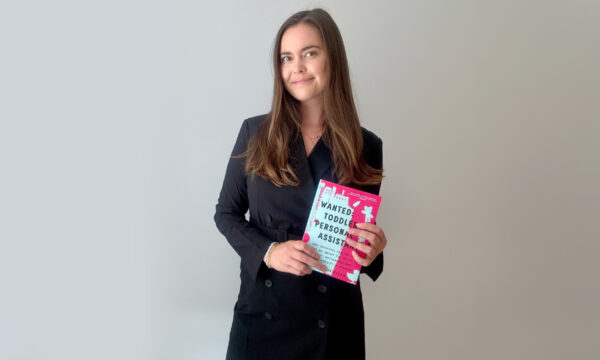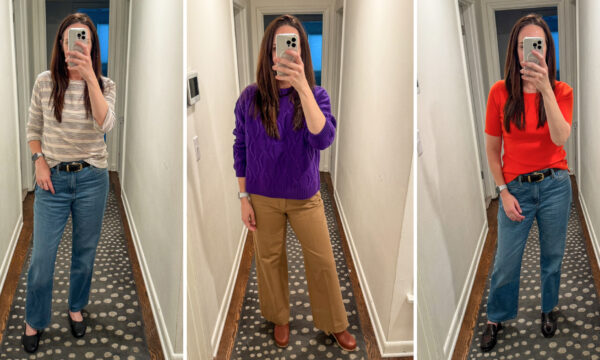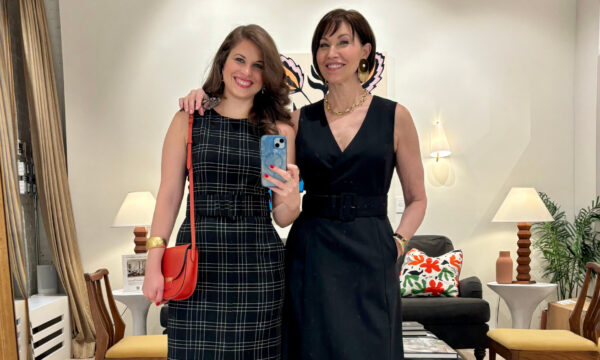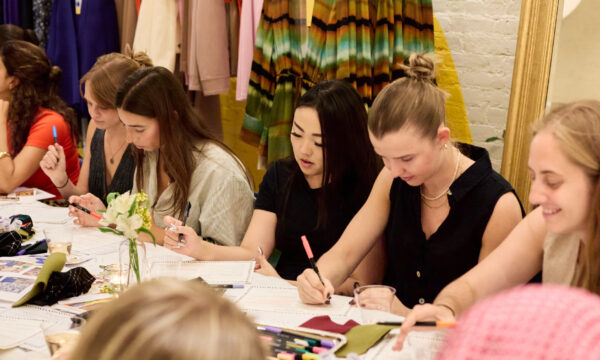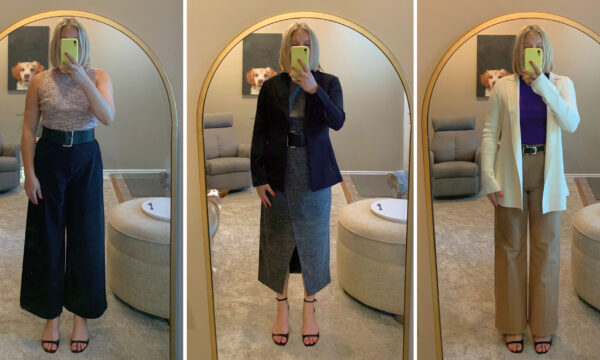
Shop This Look
Imagine you’ve just been introduced to someone new. You’ve exchanged names and swapped pleasantries, and now, you’re getting to know each other. Can you guess the next question they’re going to ask you? Chances are, it’ll be, What do you do for work?
For many of us, talking about work is the default mode of connecting with others. But is your job really the best indicator of who you are as a whole person? According to Parlay House founder Anne Devereux-Mills, there are far better ways to form meaningful connections. In this interview, she shares her top three conversation starters, her advice on expanding your social circle with quality relationships, the reason she founded Parlay House, and so much more.

Anne Devereux-Mills
Want more M Dash?
Sign up for our weekly newsletter.
Thank you!
When I started my career in advertising in the late ’80s, it was very much a man’s world. Despite the fact that I did really well and eventually rose to be a multiple-time CEO, I always felt like I was on the outside. I didn’t play golf, I wasn’t in the locker room, and I didn’t belong to the clubs that the guys belonged to. They had a bond that I didn’t have.
I had a life inflection point where everything changed: I had a recurrence of cancer, and my company didn’t want to wait for me to get better, so I lost my job. At the time, my last kid was leaving for college. Without work defining me, I didn’t know who I was.
I created Parlay House because I wanted to capture the things that I felt women didn’t have access to outside of a transactional work environment. Parlay House is a gathering space for women where we get what the men have always had: intimate time with a focus on conversation, bonding, and talking about things you can’t talk about at work or at home. We get authentic with each other without it being transactional, without asking, “What do you do for a living?” Instead, we ask, “What do you want for a life?” It started out in my living room in 2012 in San Francisco. Now, it’s in many cities around the United States, and we also have virtual gatherings every other week and a digital community.
My unmet need was the unmet need of women all over the country, of all ages, races, backgrounds, and life stages. In my generation, you couldn’t talk about vulnerabilities. Especially for me, as a single mom, I couldn’t express any fear at home. I couldn’t say that I didn’t know what I was doing or that I made a mistake. I was one of the only women in the boardroom, and I couldn’t express any sense of, again, vulnerability, feeling left out, or needing help, because I had to work way harder to just get to where the men were. To now have a place where people actually feel like they belong, regardless of what they’re going through, is truly awesome.
“When we can free ourselves from work as the only definition of who we are, we become way more well-rounded and connected people.”
I think that back in the early days, maybe even in my mom’s generation, talking about work gave women credibility outside of being a homemaker. Even in the ’50s, women having meaningful jobs was totally foreign. And now, for many women, their work is the marker of their place in the competitive hierarchy. “Here’s where I work, and here’s what I do,” is a way of saying, “I made it,” or, “I want to make it.” But what I’ve found is that when we can free ourselves from work as the only definition of who we are, we become way more well-rounded and connected people.
At Parlay House, we have one rule: Don’t introduce yourself by what you do for a living. Eliminating that option forces you to think about yourself more holistically: Who am I? What am I in the middle of? What’s changing for me? What is wonderful for me? What is terrible for me? Hopefully, those things are much more than 50% of the pie. For at least one or two nights a week, we want to celebrate who you are in your essence—not what you do or whose mother you are.

When I first moved to San Francisco, I hosted an event without a speaker, because I wanted it to be a chance for everybody to get to know each other. We started to talk about what we were reading, and that became the birth of our annual book exchange. Every year since, we’ve had an event where you bring a book that tells something about your life that you wouldn’t ordinarily tell a stranger. I love having that as a conversation piece, because you can disclose as much or as little as you want, and at the end of the night, women get to exchange books and continue the conversation with this third party proxy of the story to help with the conversation.
What we’ve also found is that women are in transition a lot. For at least a third of our adult lives, something is changing. We could be moving, we could be getting promoted, we could be entering a different life stage, we could be breaking up—whatever it is. So I like to ask, “What’s changing for you at the moment?” Times of change are when people are most open to exploring. When nothing is changing, you’re just head down doing, doing, doing—but when things are less stable, you’re more curious.
Finally, I love to ask, “What do you wish people knew about you?” A lot of times, the things that people think about us are not the things we wish they thought. Your answer might be, “You didn’t know this, but I’m obsessed with ceramics,” and then that opens the door to a conversation. Or maybe it’s, “You didn’t know this, but I actually am the least stylish person ever, and I had to think a lot about what I wore tonight, because this doesn’t come naturally to me.” It’s a nice way to say, “Here’s who I really am underneath what you might think you see.”
“One of the best things you can do in a social arena is observe the other person.”
There’s so many. Sometimes, I’ll pick something like Shakespeare Was a Woman and Other Heresies. Having a woman’s point of view on how the powers that be have developed a narrative that often leaves other possibilities out—I feel like that is very tied to what I’m trying to do in the world.
I’ve also picked Big Friendship, because that is a story about podcasters and their complex relationship with podcasting. I’ve picked lots of historical fiction, but also amazing books that are written about women. Anything by Colm Toibin. He always has incredible stories of triumphant women. Where the Crawdads Sing and The Book of Longings are also go-tos.
I’ve also brought King, which is the most recent biography of Martin Luther King Jr. It’s written by a man and about a man, but I relate to it because it paints a very human picture of someone we idealize, including their vulnerabilities and limitations. I love stories about well-rounded humans, even if they are about men, like On Earth We’re Briefly Gorgeous.

A lot of it is a matter of reading the other person. When I’m running events, I tend to open up with something very vulnerable and personal, because that sets the stage with me as the moderator that it’s okay for everybody to do that. Not everybody does. I think one of the best things you can do in a social arena is observe the other person. It’s fine to disclose something, and if they respond in kind, you know you can go there, and if they sort of clam up, you know you probably need to tone it down a little bit for this person.
I think we tend to talk more than we listen. If we spend more time listening and observing when we do say something, it’s more likely to hit in the right place. For some relationships, there’s no such thing as too fast, or too deep, but for other people, it takes a while to open up. It’s great to be able to be friends with both of those types of people.
“Don’t try to fit yourself into something that isn't exciting to you just because you want to meet people.”
If it’s a city where Parlay House exists, come! But beyond that, figure out what you’re interested in and do that. It’s very likely you’re going to find other people with those shared interests that you connect with. So if you’re interested in improv, go take a class and you’re going to bond well with those people. If you’re an outdoor person, get a group of people together to hike.
Don’t try to fit yourself into something that isn’t exciting to you just because you want to meet people. Doing things that you love will create camaraderie with other people who already love those things, and you get to start with something in common.





